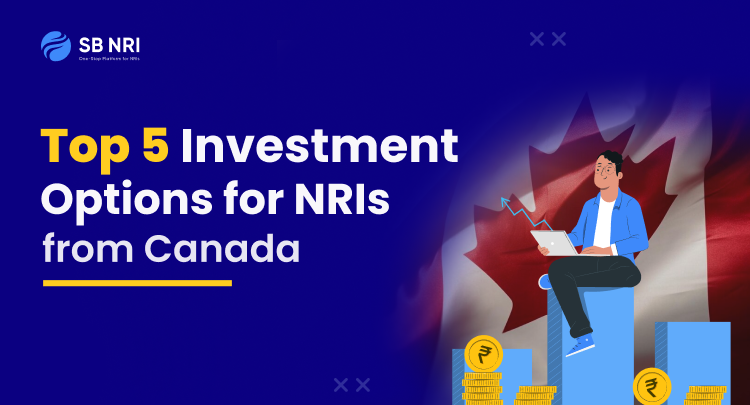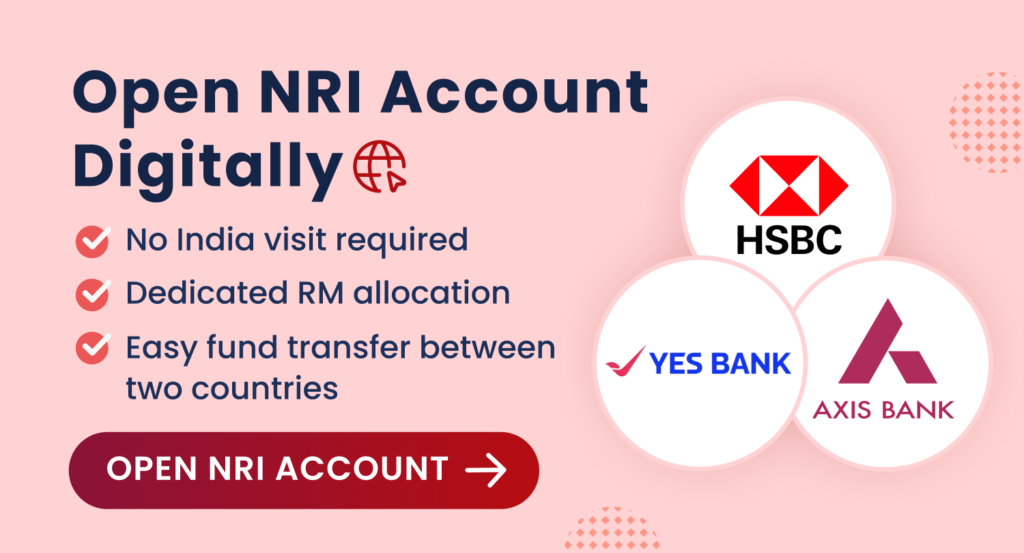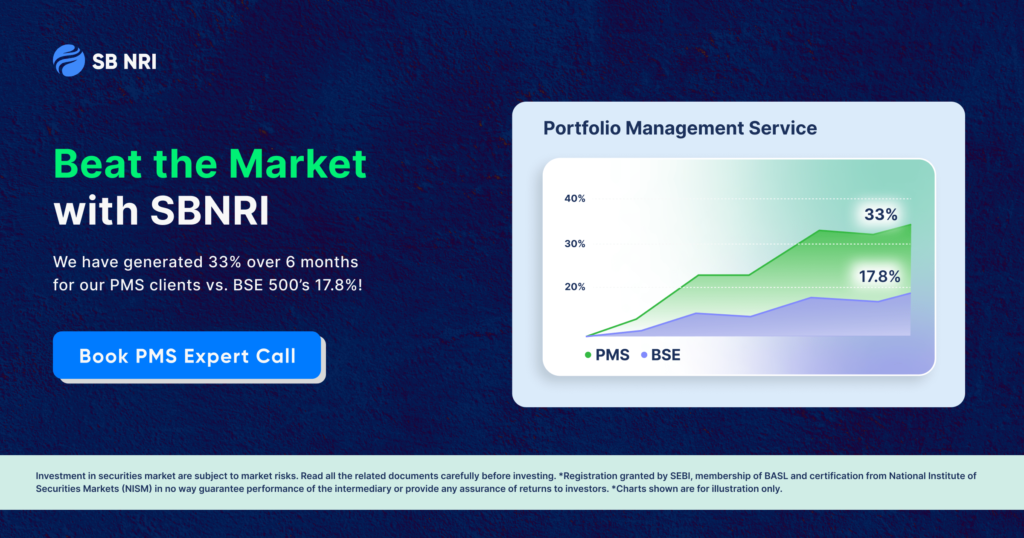
Indian economy and the growth spurt have encouraged many NRI investors to invest in India. In recent years over 63 per cent of Canadian NRIs are looking forward to wealth creation and retirement planning in India. With the wealth of options available for NRIs from Canada to invest in India, the scenario looks promising ahead. Here are the top 5 Investment Options for NRIs from Canada can choose to invest in.
Top 5 Best Investment Options in India for NRIs from Canada
1. Mutual Funds
Mutual funds pool investments from various investors and use the funds to invest in different investment avenues like equity, government securities, bonds, and more. Mutual funds can be one of the ideal investment options for NRIs from Canada with limited knowledge and understanding of the Indian market as fund managers can make the investment decisions on behalf of the investors and allow NRI investors to achieve their goals.
Mutual funds can offer much higher returns than bank FDs and can be a good option to start your investment in India. There are several NRI mutual fund schemes in India for NRI investors. However, for NRIs from Canada, there are a few compliance requirements under FACTA to be completed. Thus, only a select few AMCs offer mutual funds for NRIs based in the USA and Canada.
Also read:
10 Mutual Funds That Doubled Wealth In 5 Years
Best SIP to Invest in 2024 – Top 10 SIP Mutual Fund Plans for NRIs/OCIs

2. Fixed Deposits
Fixed Deposits are the most common investment options for NRIs from Canada. FDs are one of the safe investment options for NRI in India to invest and earn fixed income over a predefined period of time. There are three types NRI Fixed Deposit Accounts:
- Non-Resident External (NRE) Account
- Non-Resident Ordinary (NRO) Account
- Foreign Currency Non-Resident (Bank) [FCNR(B)] Account
Let’s understand these NRI fixed deposit accounts:
- Non-Resident External (NRE) Fixed Deposit: NRE FD accounts are opened by NRIs to deposit their foreign earnings in Indian rupees. NRE FD account interest rate ranges from 2.75% to 7% p.a. The interest earned in an NRE account is tax-free in India but may be taxed in your country of residence. Both the principal as well as the interest earned can be fully repatriated.
- Non-Resident Ordinary (NRO) Fixed Deposit: NRIs can open an NRO Fixed Deposit account to maintain and save their income generated in India, such as dividends, rental income, pension, etc. You can earn up to a 7.30%* interest rate on these accounts. Interest earned on the funds is taxable in India at 30% along with surcharge and cess.
- Foreign Currency Non-Resident (Bank) [FCNR(B)] Fixed Deposit: An FCNR (B) fixed deposit account allows NRIs to deposit funds in a foreign currency in India, such as USD, GBP, EUR, JPY, AUD, CAD, SGD, HKD, and others. You can deposit money for different terms, like 12 months, 24 months, 36 months, 48 months, or 60 months. An FCNR account helps NRIs avoid currency fluctuation. FCNR FD interest rates vary based on the currency. The interest income is not taxable in India and both the principal amount as well as the interest are completely repatriable.
Also read: NRE Fixed Deposit Rates 2024: Top Banks for NRE FDs

3. Commercial Real Estate
Real estate has been a traditional long-term investment option with the Indian diaspora. With new investment options like Commercial real estate becoming a prominent option, the investment options for NRIs have increased multifold. Over 52 percent of NRIs looking to invest in commercial real estate properties as a means of portfolio diversification and long-term wealth generation. NRIs can invest in various commercial real estate properties and earn stable, high-yield, and risk-free returns.
Also read: Bhive Investment Review: Bhive Workspace & Bhive Alts Review
4. Portfolio Management Services (PMS)

Portfolio Management Services (PMS) allows NRI investors from Canada with high net worth to invest in the Indian equity market. Fund managers make the decisions on behalf of the investors and invest in the desired portfolio of stocks as per the investment goals and risk tolerance of the investor. NRI investors can invest in PMS with Rs 50 lacs and curate a tailored portfolio for themselves.
Also read: PMS for NRI: A Comprehensive Overview
5. National Pension Scheme
National Pension Scheme or NPS can be one more reliable source of investment for NRIs from Canada in India. NPS scheme is fully backed by the government and allows NRIs to invest in equity funds, debts, or a combination of both.
Individuals between the ages of 18 years and 60 years can invest in NPS with minimal documents like a PAN card and an Aadhaar card. You need a Non-Resident External (NRE) account or a Non-Resident Ordinary (NRO) account when investing in NPS.
Other Noteworthy Investment Options for Non-Resident Indians (NRIs) of Canada
1. Public Provident Fund (PPF)
Canadian NRIs can continue with his/ her PPF account which they opened as a resident Indian. However, if an NRI doesn’t have a PPF account, she/ he can’t apply for the same with non-resident status. NRIs can’t extend their PPF account after the maturity period of 15 years.
Wrapping Up
Investing as an NRI from Canada provides an array of opportunities, each with its unique advantages and challenges. It’s essential to assess your financial goals, risk tolerance, and investment horizon before choosing the right option. Making informed investment choices can help NRIs from Canada secure their financial future and support their loved ones back home.
How to Invest in India as NRI from Canada
NRIs can now download the SBNRI App and choose to invest in different investment options in India with ease. You can also get detailed investment advice from experts at SBNRI. Also, visit our blog and YouTube channel for more details.
SBNRI is an authorized Mutual Fund Distributor platform & registered with the Association of Mutual Funds in India (AMFI). ARN No. 246671. NRIs willing to invest in mutual funds in India can download the SBNRI App to choose from 2,000+ mutual fund schemes or can connect with the SBNRI wealth team to better understand Mutual Fund investments.
FAQs
Can NRIs from Canada invest in the Indian stock market?
- Yes. NRIs from Canada can invest in the Indian Stock Market by buying stocks listed on the National Stock Exchange of India Ltd. (NSE) under the Portfolio Management Service (PMS).
Can Canadian NRIs invest in India with just a PAN Card?
- Yes, Canadian NRIs can use a PAN card and NRE/NRO account to invest in a mutual fund. To invest in shares, NRIs need an NRE account under PIS bank or NRO account, a bank account, and a Demat account.
Can NRIs from Canada have 2 demat accounts?
- Yes. A non-resident Indian from Canada can have multiple demat accounts. The usage of these multiple demat accounts can be understood under the concepts of:
1. Repatriation: NRIs must have separate demat accounts for repatriable (NRE) and non-repatriable (NRO) shares which means if you invest through your NRE account, the money you receive after selling the shares/stocks is completely and freely repatriable whereas investments through NRO accounts will have to be initially settled by paying applicable taxes and then they can be repatriated. NRE accounts are used to buy shares (equity) on a repatriable basis and NRO accounts are used to invest in shares (equity and derivatives) on a non-repatriable basis. The NRE/NRO Accounts can be used to invest in the primary market without PIS (Portfolio Investment Scheme) (eg: IPOs, Mutual Funds)
2. Market Variation: In order to invest in the secondary market you need a separate bank account to hold your investment funds that will be linked to the Portfolio Investment Scheme (PIS). This account can not be your regular NRE/NRO account and this account will be linked to a demat account to hold your shares as directed by RBI.
Can NRIs from Canada invest in property in India?
- Yes. An NRIs from Canada can invest in property in India but there are exceptions. Though RBI has given general permission to the NRIs to purchase immovable properties in India, the permission does not grant power to acquire any and every property in India. The NRIs are allowed to purchase only residential or commercial property. So NRIs cannot purchase any agricultural land or plantation property.
Can NRIs invest in PPF?
- Yes, NRIs can have a Public Provident Fund (PPF) and invest in it. However, an NRI can open a PPF account when he/she is a resident Indian.
Are there any tax-free investments for NRIs in India?
- Yes, there are a few tax-free investment options for NRIs from Canada available in India like NRE FD Account, FCNR FD Account, ELSS Funds, and Life Insurance.
How can NRIs invest in India?
- Here are the steps an NRI can follow to invest in India:
1. Open an NRE or NRO (Non-Resident Ordinary) bank account: NRIs need to open an NRE or NRO bank account with an Indian bank to invest in India. An NRE account is used for investing foreign earnings that can be repatriated, while an NRO account is used for investments made from earnings in India that cannot be repatriated.
2. Obtain a Permanent Account Number (PAN): NRIs need to obtain a PAN card to invest in India. This card is required for opening a bank account, investing in the stock market, and purchasing property in India.
3. Complete KYC norms: NRIs need to complete the KYC (Know Your Customer) norms by submitting the necessary documentation such as a copy of their passport, address proof, and PAN card.
4. Choose an investment option: NRIs can choose to invest in various options such as stocks, bonds, mutual funds, real estate, and more. NRIs can also invest in the Indian stock market through the Portfolio Investment Scheme (PIS).
5. Ensure compliance with regulations: NRIs need to ensure compliance with all applicable regulations and laws when investing in India.
However, it’s recommended that NRIs consult with a professional financial advisor or tax consultant to ensure compliance.
What are the benefits of investing in India as an NRI from Canada?
- Given below are the benefits of investing in India for NRIs from Canada:
1. Diversification: Investing in India can provide NRIs with a diversification option outside of their home country. This diversification can help to minimize the overall risk in their investment portfolio.
2. High Growth Potential: India has a growing economy with many investment opportunities. With the rise of the middle class and increasing urbanization, there is a lot of potential for growth in various sectors such as real estate, infrastructure, and manufacturing.
3. Favorable Demographics: India has a young population, and with increasing disposable incomes, there is a significant demand for various products and services. This demographic advantage provides a huge potential for businesses and investments in the country.
4. High Returns: Historically, Indian investments have provided high returns to investors. The Indian stock market has outperformed many other markets over the past few decades, and there are many sectors that have the potential for high returns.
5. Tax Benefits: NRIs investing in India can take advantage of various tax benefits. For example, NRE accounts are tax-free, and NRIs can benefit from the Double Taxation Avoidance Agreement (DTAA) between India and their home country.
6. Repatriation of Funds: NRIs can repatriate the funds invested in India along with the profits earned from the investment, subject to certain conditions.
How can NRIs from Canada invest in Indian Mutual Funds?
- An NRI from Canada can invest in Indian Mutual Funds using his/her NRE/NRO Account. The NRE Account is used to invest on a repatriable basis and the NRO Account is used to invest on a non-repatriable basis.
Can I invest from Canada in India?
- Yes an NRI can invest from Canada in India in various asset classes such as FDs, Mutual Funds, Stocks, etc.
Can NRIs from Canada invest in SIP in India?
- Yes, an NRI from Canada can invest in India through the SIP route. SIP stands for Systematic Investment Plan.



